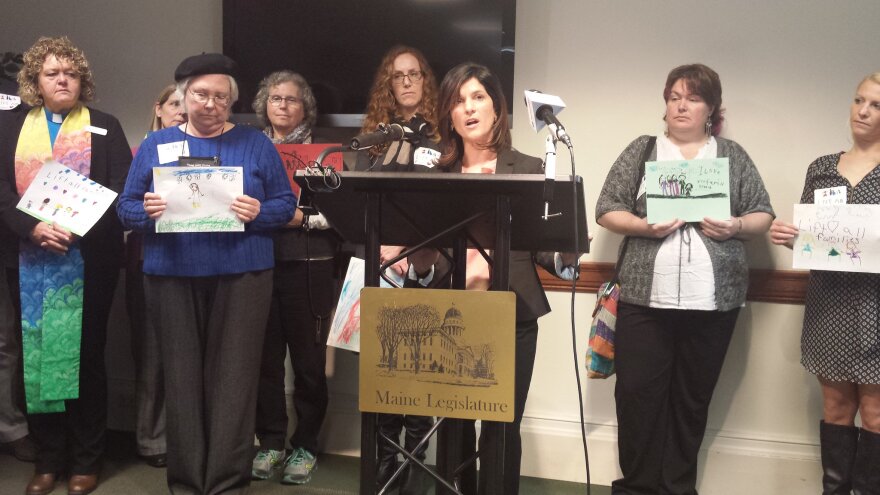Maine Democrats say the LePage administration must do more to reduce the numbers of children in severe poverty — and they’re proposing that the state access $150 million in available federal block grant funding to that end.
But Gov. Paul LePage and other Republicans say the Democrats’ plan to expand welfare would actually make many Mainers more dependent on state benefits.
Here in Maine the poorest of the poor earn about $10,000 a year for a family of three. That’s considered deep poverty, and Democratic House Speaker Sara Gideon says the number of children in deep poverty is rising at an alarming rate.
“The percentage of children who are living in deep poverty has increased at a rate that is a staggering — eight times the rest of the nation,” she says. “And here in New England Maine’s rate of deep child poverty has increased at more than twice the rate of any of our neighboring states.”
During a State House press conference, Gideon said the LePage administration has opted not to tap into federal block grant money that could be used to expand services for poor Maine families. She’s sponsoring a bipartisan bill to help with some basics like housing and heat, create economic opportunities for families to get ahead and, she says, make it easier for people to get back to work.
“It doesn’t matter who you are, where you live or what letter you put after your name,” Gideon says. “The very idea of any child experiencing the sort of insecurity, instability, anxiety and hunger that comes with poverty is just not acceptable.”
Gideon says that during the years of the LePage administration, poverty, along with childhood hunger, has increased. And pediatricians such as Dr. Stephen Meister say children who experience hunger, poverty, inadequate early education and inadequate health coverage experience lifelong and permanent consequences.
“Children who are born into poverty and live persistently in poor conditions are at greatest risk of adverse outcomes,” Meister says. “They don’t have an equal opportunity. Poor children tend to remain poor and live in neighborhoods of low economic opportunity. And children in impoverished communities are at risk for bad health outcomes.”
Gideon’s says her measure, known as LIFT, will address the most basic needs of families with children struggling with poverty and help improve their chances for employment later in life.
Denise Buzelli, executive director of the Piscataquis Chamber of Commerce, says about one-fifth of the 10- to 19-year-olds waiting to enter Maine’s workforce are living in poverty and struggle to meet the skill requirements needed by employers.
“These statistics should raise the alarm bell for Maine businesses,” she says. “Not only do they foretell rising poverty rates, but they also predict a growing pool of low-skilled workers at a time when Maine needs high-skilled workers. Maine cannot afford to squander the potential and promise of the next generation. We cannot afford to lose even one child.”
Maine Department of Health and Human Services Commissioner Mary Mayhew opposes the LIFT bill and says Gideon and other Democrats are proposing irresponsible spending through welfare expansion. She says that rather than lift families out of poverty, Gideon’s plan would actually make those Mainers seeking assistance more dependent on state benefits.
Lawmakers will be considering the measure over the next few weeks.


